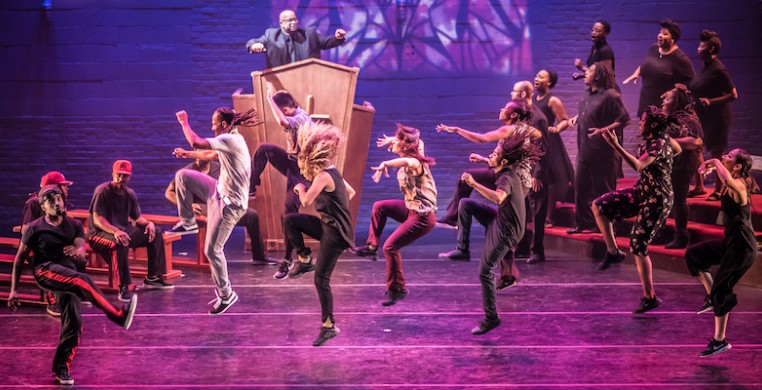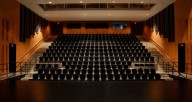I can hear humming in the audience as soon as I take my seat in the theater at the Museum of Contemporary Art (MCA) for Rennie Harris’ new work, “Lifted.” I hear humming and can feel an energy that is not like the average pre-show buzz. The humming comes from a woman sitting ahead of me. She rocks gently from side to side, and ad libs to the chords coming from a single piano player on stage. Slightly lit by blue lights and framed by empty rows of pews, a choir stand and a larger than life podium, the piano player (choir director Joshua Sommerville) lets out “The Lord is blessing me right now, oh right now.” Those of us in this ad-hoc congregation who know it sing along and get caught up in a place we once knew, as we continue to find our seats and greet one another. The humming and buzzing are louder now with even more “amens” and “yessirs” and “sing ya’ songs” echoing in the space.
An extension of this invocation, the dancers—which include Rennie Harris’s Puremovement company members as well as local Chicago artists—emerge from stage left and right in slow motion tableaus: friends greeting each other, parents and child connecting, then arguing. They freeze in time, as news footage of police shootings project through a stained-glass window. We can barely make out the details of the projection save for the small glimpses of news headlines and body parts—a beautiful, yet, horrific, collage. Layered with a poem by Wadud Ahmad and the incredible sounds of a gospel choir made up of vocalists from Mosaic Soul (led by Philip Armstrong) and the St. Benedict the African Catholic Church—one of the very few Catholic churches to serve a predominantly African American congregation in Chicago—the dancers “jack”, “nae nae”, and “whip” (black social/street dances) in parallel to the news footage, raising the energy in the room to a rapturous high.
Following the story of a troubled young black man played by Joshua Culbreath, “Lifted” sheds light on the interconnected histories of gospel, house music and culture in a hip-hop theatre production that is exhilarating and transportive. With every pop, lock, twist and shuffle, the dancers push energy out to the audience like a call-and-response where we can’t help but shout back, exchange looks with the person next to us and dance back to the downbeat. Even for those who are unfamiliar with the references to gospel house—a genre of music that began in the late ‘80s merging traditional gospel sounds with beats from the club referencing the godfather of house, Frankie Knuckles’, revelation that “clubs are like church”—“Lifted” opens space where everyone joins in the universal groove of joy.
The highlight of the performance is a gorgeous solo by Culbreath with equally brilliant accompanying vocals by Carl Robinson Jr. A b-boy himself, Culbreath defies gravity by turning on his head and propelling his whole body through the air in a smooth, cool way that is both painful and beautiful to watch. Robinson’s rendition of the gospel classic, “I Need You Now” by Smokie Norful echoes Culbreath’s dire need for guidance. The twists and turns of his legs and arms capture a beautiful moment between a young man and the community that supports him in his process to self-realization.
As someone who grew up in the Pentecostal church in the South and came of age in Chicago’s house culture, it was refreshing to see both worlds represented on the concert stage, especially as part of the MCA’s month-long celebration of black creativity that seems right on time.


